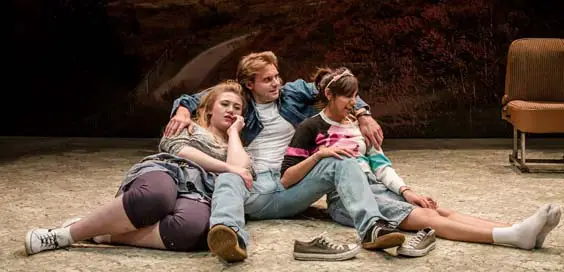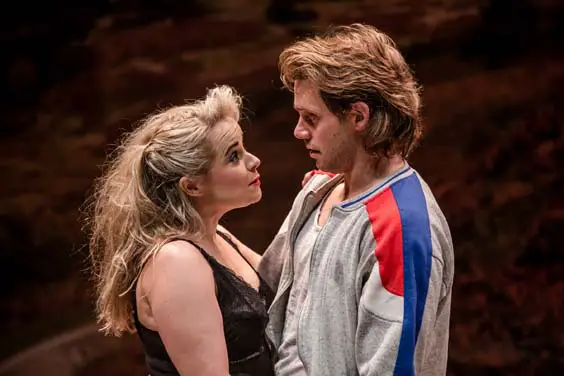Rita, Sue and Bob Too – Review – York Theatre Royal

By Eve Luddington, November 2017
This semi-autobiographical play shocked its first audiences when it was premiered in London in 1982. It was written by Andrea Dunbar at the age of 19, a young woman who had grown up on Bradford’s Buttershaw estate and held a mirror up to her own life there.
Her first play, The Arbor, came out of a CSE English project when her teacher recognised Dunbar’s talent and encouraged her. In Rita, Sue and Bob Too, the subject is what we now call ‘grooming’. Today, the issues are uncomfortably familiar, but this play remains fresh and, yes, shocking.
What distinguishes Andrea Dunbar’s play is her approach and perspective. She was speaking from experience, with no sentimentality, self-pity or genteel veneer. Pacy, quick-fire dialogue peppered with insults is hurled between characters, and sex is depicted as a crude and awkward act (especially in a car). There’s more laughter than overt reflection in this play, but the grim story tells itself – and there are some powerfully affecting moments.
This production, newly edited by John Hollingworth, sticks to the 1982 setting. On each side of the stage, the exterior of a run-down block of flats faces the audience. The backdrop is a projection of the moors overlooking Bradford. On the floor are four car seats. The action erupts in pink light with all characters dancing to Soft Cell’s 1981 version of ‘Tainted Love’ or, in Dad’s case, drunkenly eating chips.
“Dalliances”
Rita and Sue, both 15, babysit for Bob and his wife Michelle. One night, Bob takes the girls onto the moors before driving them home with their giggling permission. He educates them in the middle-class language of sex, telling them that ‘erection’ is the correct term for ‘getting a hard on’, that ‘Durex’ is the proper name of what they call a ‘rubber Johnny’. They have no idea what a Durex is for so he tells them, demonstrates how to use one – and then has sex with Sue and Rita in turn.
The late-night sex in a car on the moors becomes a pattern. In this three-way relationship, Rob casually squashes the girls’ aspirations, ridiculing Rita’s dream of moving to London and joining the police. Rita’s family is noticeably absent from the scene but Sue’s dad, in open shirt and vest, guesses that his daughter’s been ‘up to no good’, and rages at her.
Mum screams at dad, then warns Sue off – but she’s gripped by the attentions of her first ‘lover’, 12-years older and much more well-heeled. When Michelle confronts her husband with a packet of condoms, he justifies his dalliances by blaming her lack of interest in sex, while swearing convincingly that he would never do anything like that with such young girls.
When Bob comes close to hitting Michelle, there are a few seconds of shocked silence onstage and among the audience too. But it isn’t a light-bulb moment for Bob; he is not to be redeemed.
“Parental neglect”
This play certainly does not show men in a positive light, but ultimately it’s about the consequences of inequality and poverty. Throughout the evening, I was struck by the fact that we were all caught in the young girls’ conviction that their relationship with Bob was amusing as well as ‘par for the course’. Their ambitions are skin-deep because they have no means of fulfilling them; they have no reference to a different way of living.
Such a brutally honest play requires a rawness of acting which, I think, often evades professionals. For me, the stand-out performance was Gemma Dobson as Sue in her professional stage debut. This actor inhabits the character entirely and her timing is superb. In one scene, she shares a bag of sweets so casually with Rita that it took away my breath. I’ve seen Dobson’s Sue on the streets of Yorkshire, overtly confident and in control but so vulnerable and – young.
Rita is the more naïve of the two girls, ultimately trapped when she mistakes Bob’s abuse for the male affection and love she’s never had. Taj Atwal plays her convincingly as a gangly, giggly adolescent who reveals her parental neglect with throw-away remarks and seems delighted to be caught in the trap of pregnancy and co-habitation.
James Atherton balances well Bob’s undoubted charm with his machismo and crude brutality. He communicates powerfully the realisation that his ‘escapades’ have consequences. Perhaps the class-difference between him and the girls could have been more sharply portrayed to project another instance of power imbalance, but overall, the relationships between the three, playful until they’re not, were entirely and sadly believable in this production. It’s crucial to Dunbar’s plot and theme that this is the case.
“Stoic acceptance”
Michelle is played by Samantha Robinson with flashy clothes, 6-inch stiletto heels and bravado. Michelle emerges from her marriage with some feistiness and much cynicism, but I imagine the character’s nerves along her journey to be more frayed than in this portrayal.
Dad is a slob at whom we can only rage and laugh: David Walker played the role perfectly. I was not entirely convinced by Sally Bankes’ mum, Sue’s family anchor, early in the performance because it seemed as if she’d put on the character rather than put herself into it, and she had a distracting wig; but in later scenes the character engaged me.
The audience’s shock and sympathy are reserved, in the main, for the girls, but it struck me that all these characters are limited by their stoic acceptance of the status quo, their poverty of aspiration and society’s dismissal of their circumstantial plight.
“Awareness”
The production is enhanced by danced scene-shifting to 80’s hits: there’s no chance of the pace dropping. In fact, occasionally I would have welcomed a few more thoughtful moments, but overall this is an excellent production of Dunbar’s brilliant, hard-hitting and funny play.
When Andrea Dunbar briefly attracted fame in the 80s, she seemed surprised and told an interviewer: “There’s people in Buttershaw a lot more clever than I could ever be. I just stumbled across this writing by accident, whereas other people haven’t had the opportunity to get out and do that. They’ll forget about us all tomorrow’, she predicted. (quoted in an Independent article, 16 Oct. 2010).
She died of a brain haemorrhage at the age of 29 and it seemed for years as if ‘they’/we had. Recent revivals reflect the growing awareness that the kind of life she brought to the stage is as current today as it was then.
Dunbar’s second daughter, Lisa (b. 1980), who has terminal cancer is campaigning for a memorial to be erected in Bradford in honour of her mum. Andrea deserves it – and I think we need it.
images: The Other Richard













